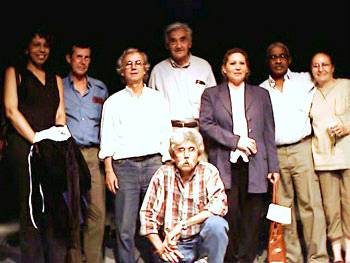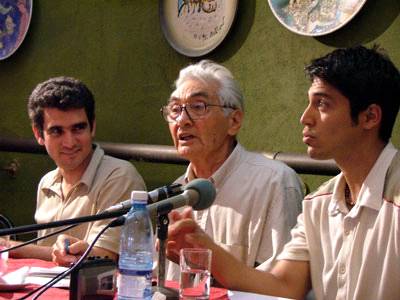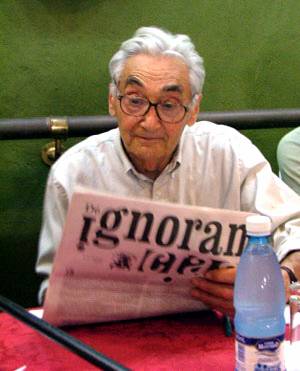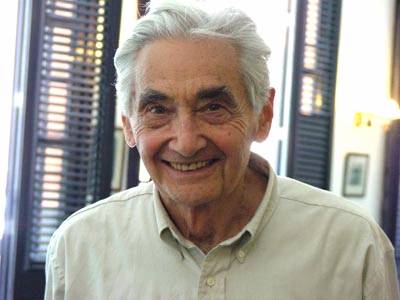Interviewed by M.H. Lagarde, Photos by Alain Gutierrez, Translated by Ana Portela • La Habana • May 8, 2004

“Thank God, an audience! I am happy you could come. You haven’t listened to those idiots who said Marx is dead! Well I am…and I’m not!” -Karl Marx says in the very heart of Havana.
The audience to which this eternal party-pooper risen from the dead refers is about a dozen people seated in the small Adolfo Llauradó Theater in the central part of the City, Vedado. While the actor embodying Marx moves and talks on stage, the audience divides its attention from the performance and the silhouette set off by a faint light of this tall and gray-haired man who, from his chair, keeps jotting down notes in a notebook. It is Howard Zinn, the U.S. writer and historian, who has come to see the production of his monologue Marx in Soho by the Cuban actor and theater director Michael Cué
Invited by the National Council of Theater Arts and the Cuban Book Institute, Zinn takes advantage of his second trip to the island to brush up on Cuban reality. His first visit was during the 1970s with a group of Canadian tourists.
Among other places of interest, the 81-year-old writer visited the Fine Arts Palace, the San Alejandro School of Painting and the National School of Ballet. This interview was made in this latter institution, after visiting its modern halls and installations in what were described by the author of the People’s History of the United States as “a dance palace filled with princesses and princes. Here, the author of the Zinn Reader and You Can’t Be Neutral on a Moving Train, talks of his theatrical work that the Cubans will now have the opportunity to enjoy this coming June, as well as some subjects about the current situation in the United States.
One of your students, the well-known novelist Alice Walker, has defined the writer as a sort of mediumâ. How was Howard Zinn inspired to revive Karl Marx?
When I was 17, I began to read Marx and Engels. At 18 I began to work in a shipyard. Together with three other radical young people, I organized the Young Shipyard Workers Union. At that time, unions were very exclusive and young persons could not join them. The four of us became a team and met once a week. We read Marx and many years later, when I became a professor, I gave a seminar on Marxism. I read a lot of literature on Marx and became interested in his family life. For me to learn about him as a human being is as important as learning of his ideas.
My first theater work was not about Karl Marx but about an anarchist and feminist, Emma Goldman. That play was shown in several cities of the US: New York and Boston, but also in London and Japan. Later, already interested in the theater, I decided to write a play about Marx. I made this decision after the fall of the Soviet Union because, after its fall, everyone thought that Marxism had died. So I tried to tell the US public: Marx is not dead and I am going to prove it by bringing him back to the scenario. From there I would teach this same public the difference between Stalinism and Marxism. I would remind them what Marxist criticism of capitalism consists of. I would demonstrate that these ideas have much to do about the US today. In other words, that Marxist criticism of capitalism is still exact and current today.
Since I didn’t want to only represent ideas, I added information about the relationship between Marx and his family, a little bit of humor, and a vision of what a new society could be. That is why I have Marx speaking in the Paris Commune of 1871. The Commune is a small light.
What has been the reception of Marx in Soho in the United States? Didn’t they confuse you with Groucho Marx?
The US people know more about Groucho Marx than about Karl Marx. The play has been shown in forty venues in the US, mostly for a university public. The number of spectators has fluctuated from three hundred to a thousand and the play has always been well-received, perhaps because it presents Marxist ideas clearly and simply. It is a question of common sense. The play is a combination of humor and experiences, human and family, and one can even laugh at Marx. It is what happens when Jenny laughs at him and Eleanor does the same. I think this is more attractive for the public. Marx doesn’t come on stage as someone who knows it all.
Is there a presence in US academies, the universities, is his work studied?

Sometimes. Perhaps in one out of every hundred universities there is a course on Marxism. There are many courses of political philosophy and perhaps a few days are set aside for Marx. Usually his ideas are not taught with exactness.
Perhaps in one out of every hundred universities t here is a course on Marxism. There are many courses of political philosophy and perhaps a few days are se t aside for Marx. Usually his ideas are not taught with exactness.
Can this lessening of Marx be intentional?
It is ignorance.
In your work you touch on many ideas that are current. One is the allusion you make of the Marx character about the cowardice of the press. What is your opinion on the cowardly role of the press today inthe US in relation to the war in Iraq?
There are two parts of the press in the US. One is television and the powerful newspapers that generally support the position of the government, especially its positions on foreign policy. For example, none of the important newspapers say that the US should withdraw from Iraq. They say things should be done differently; they propose getting the UN involved, a UN that they ignored from the very beginning. They say that they need more soldiers and don’t have more soldiers. “We should have a better plan to occupy Iraq”, but there is no form of basic criticism. This is what happens in the powerful press. There is also the opposition press that has a much smaller circulation. For example, The New York Times reaches more than a million persons while The Nation reaches a hundred thousand persons. The great television chains reach 30 million persons while the smaller cable television only reaches several thousand persons. The same happens with progressive radio stations may reach, perhaps, 50 thousand persons.
After a book such as that by Richard Clarke or by Bob Woodward, revealing the lies and evil machinations of the present administration, how is it possible that a scandal in the style of Watergate has not occurred?

The ignorance of the US public is very hard to explain. They know there were lies but, perhaps, they are used to these lies. They see on television and in the newspapers that there are things that are not the truth, but don’t follow it up with the conclusion that the invasion of Iraq was wrong. Bush can say: “Well, we didn’t find weapons of mass destruction but we had to get rid of Saddam Hussein.” They are always changing the reason for the invasion, and if one of them is false, they invent another. In a national survey about which television channels were most watched by the population, it was revealed that the majority watch news on the Fox chain. Of these, 80% say that weapons of mass destruction were found in Iraq. In other words, the great mass media confuse their viewers. You will never find real and direct criticism of the war in Iraq on these stations. It is interesting to note that, in the United States, with these television and large-circulation newspapers, the people are the least-informed in the world.
In your play, Marx quotes the well-known words of Lincoln that says that you fool some of the people but not all of the time. How long will we have to wait for the people of the US to stop being manipulated?
This process has already begun. The number of persons supporting the war is declining. When asked if the war was worth it, only 35% of the US public answers “yes”. This is different from what occurred six months ago or three months ago. Every day there is a more striking difference between the editorials and the news reports. While the editorials do not make fundamental criticism of the war, the news articles report on the increasing number of casualties of the US forces. These past weeks, as you know, reports have come out on the torture of Iraqi prisoners. When the US people see this history time and again, it has an eroding effect on their belief in the government. Yes, Lincoln was right, but he didn’t say how long it would take.
You have shown yourself as an optimist on the idea that the people can change the world if we do it all together, no matter how insignificant it may seem. Of course, the intellectuals are part of that people. What could they do to change the world?
 The intellectuals can only do part of the job. When a nation changes, it is not because of the work of the intellectuals. Yes, the role of the intellectuals has an effect, but the greatest effect is the reality. When it reaches the people. There is the example of the movement against the war in Vietnam. At the beginning, two-thirds of the US people supported the war. Two years later, this same number opposed it. What happened in the meantime? Of course, the intellectuals with their articles and teachings had an effect, but the most important factor was the reality. It was reported in the great mass media. An example was the publication of the photographs of what really happened in Vietnam. Sometimes the intellectuals have an exaggerated view of their own importance.
The intellectuals can only do part of the job. When a nation changes, it is not because of the work of the intellectuals. Yes, the role of the intellectuals has an effect, but the greatest effect is the reality. When it reaches the people. There is the example of the movement against the war in Vietnam. At the beginning, two-thirds of the US people supported the war. Two years later, this same number opposed it. What happened in the meantime? Of course, the intellectuals with their articles and teachings had an effect, but the most important factor was the reality. It was reported in the great mass media. An example was the publication of the photographs of what really happened in Vietnam. Sometimes the intellectuals have an exaggerated view of their own importance.
Published at La Habana • May 8, 2004
Republished by La Jiribilla



